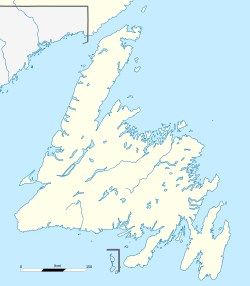Belleoram
Belleoram | |
|---|---|
Town | |
 | |
 Belleoram Location of Belleoram in Newfoundland | |
| Coordinates: 47°31′22″N 55°24′39″W / 47.52278°N 55.41083°W | |
| Country | |
| Province | |
| Government | |
| • Mayor | Steward May |
| Area | |
| • Land | 2.11 km2 (0.81 sq mi) |
| Population (2016)[1] | |
| • Total | 374 |
| • Density | 177.3/km2 (459/sq mi) |
| the 1921 Census recorded 698 persons in 140 households | |
| Time zone | UTC-3:30 (Newfoundland Time) |
| • Summer (DST) | UTC-2:30 (Newfoundland Daylight) |
| Area code(s) | 709 |
| Highways | |
Belleoram (/bəˈlɔːrəm/)[2] is a village on the shores of Fortune Bay in the Canadian province of Newfoundland and Labrador.
The community sits on a narrow strip of land hemmed in between the bay and steep hills that rise behind it. Belleoram has a large harbour and shelter from the sea, with the protection of a natural breakwater.
Belleoram, a fishing community, had a fish plant which closed in 1989.[3] Aquaculture and fishing farm are important economic drivers.[4]
Belleoram dates back to 1774. The French used the area and called it "Bande de Laurier." By 1713, the Treaty of Utrecht had forced the French to leave. In 1718, Captain Tavenor sailed around the south of Newfoundland and called it "Belorme's Place." In the 17th century, a French adventurer wintered there for 20 years, and he was the first to name the community Belleoram.
A Dorchester man named Parsons, is said to be the first English settler in Belleoram, followed by another Dorchester man named John Cluett. Other people came from the west of England as servants to the early planters.
The Anglican Church in Belleoram, locally known as the "Cathedral of the South Coast" was built in 1891 and consecrated as St. Lawrence Church in 1901. The Church is representative of Gothic architecture, a style of architecture developed in Western Europe between the 12th and 16th centuries.
Visitors can see the John Cluett Heritage House which was built about 1844 and is best described as a "saltbox," one of the simplest forms of architecture and common amongst early settlers. The Cluett House, which is over 150 years old, is constructed mainly of original timber.[5] Also, they can attend the Ironskull Folk Festival, which is an annual event held the third weekend of July every year. The festival showcases the area's musical talent and is a collaboration among many Newfoundland artists.[6][7] The Ironskull Festival takes its name from the mountain located across the harbour. A trail provides visitors with the opportunity to hike to the summit and view the surrounding coastline.
See also[]
References[]
- ^ Jump up to: a b "Census Profile, 2016 Census Belleoram, Town [Census subdivision], Newfoundland and Labrador". Statistics Canada. Retrieved October 22, 2019.
- ^ The Canadian Press (2017), The Canadian Press Stylebook (18th ed.), Toronto: The Canadian Press
- ^ "Fish farm raises hopes for Belleoram". CBC News. May 31, 2006. Retrieved October 22, 2019.
- ^ Hunt, Clayton (September 29, 2017). "May key member of community". The Central Voice. Saltwire Network. Retrieved October 22, 2019.
- ^ "Cluett House (Belleoram)". Newfoundland and Labrador Heritage. Retrieved October 22, 2019.
- ^ "Newfoundland and Labrador government announces Cultural Events Fund recipients". The Southern Gazette. Saltwire Network. July 23, 2018. Retrieved October 22, 2019.
- ^ "Three big events in Coast of Bays in July". The Telegram. Saltwire Network. September 29, 2017. Retrieved October 22, 2019.
- "Welcome to Belleoram". Archived from the original on July 17, 2011.
Coordinates: 47°31′22″N 55°24′39″W / 47.52278°N 55.41083°W
- Populated coastal places in Canada
- Towns in Newfoundland and Labrador
- Newfoundland and Labrador geography stubs
